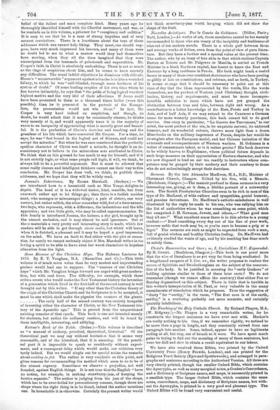Nouvelles Asiatiques. Par le Comte de Gobineau. (Didier, Paris ;
Nutt, London.)—As works of art, these novelettes cannot be too warmly recommended to those who are weary of the insipidity and feebleness of nine out of ten modern novels. There is a whole gulf between them and average works of fiction, even from the point of view of pure litera- ture. But they have a further and a special value at the present time.. The author, who by an irony of fate akin to that which stations Captain Burton at Trieste and Mr. Palgravo at Manilla, is settled as French Minister in a bleak Northern capital, has learnt to know the East and. Easterns by a long residence in Persia. His book might teach a useful lesson to many of those over-confident doctrinaires who have been prating so glibly of late on constitutions, and reforms, and so forth, in Turkey.. It seems strange that it should be necessary to point out at this time of day that the ideas represented by the words, like the words themselves, are the product of Western (and Christian) thought, civil- isation, history, and requirements, and must be mere incompre- hensible subtleties to races which have not yet grasped the distinction between true and false, between right and wrong. As a contribution to a batter knowledge of the East, Persia and Turkey in Asia, and of half Asia, if we may extend to the Caucasus a German name for more westerly provinces, this book cannot fail to do good service. One story in particular, "La Guerre des Turcomaus," to our mind, the most perfect of the six, in its exquisite naivete, its unforced humour, and its wonderful entrain, throws more light than a dozen. Blue-books on the military impotence of Persia, despite her would-be strategists after the European model, and her Chinese imitation of the externals and accompaniments of Western warfare. M. Gobineau is a. writer of consummate talent, or is it rather genius ? His book deserves to be widely known to Englishmen, whose political future depends in such large measure on their appreciation of Eastern character, and who aro now disposed to lend an ear too readily to instructors whose com- petence may be gauged by their modesty and their courtesy to those who do not unhesitatingly accept their doctrines.


































 Previous page
Previous page